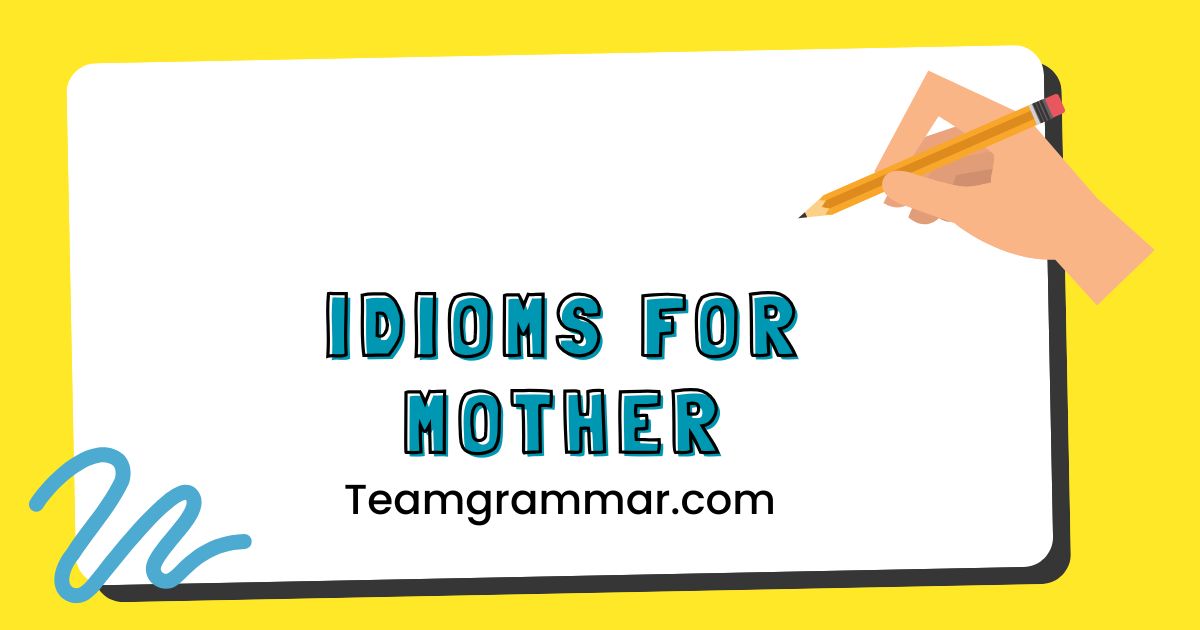50 Idioms for Mother: Mastering Figurative Language
Understanding idioms enriches your English vocabulary and improves your comprehension of nuanced expressions. This article focuses specifically on idioms related to “mother,” exploring their meanings, origins, and usage.
Mastering these idioms will not only enhance your communication skills but also provide a deeper appreciation for the cultural significance of motherhood. This comprehensive guide benefits English language learners, educators, and anyone seeking to refine their understanding of figurative language.
Table of Contents
- Introduction
- Definition of Idioms
- Structural Breakdown of Idioms
- Types of Idioms
- Examples of Idioms for Mother
- Usage Rules for Idioms
- Common Mistakes with Idioms
- Practice Exercises
- Advanced Topics in Idioms
- Frequently Asked Questions
- Conclusion
Definition of Idioms
An idiom is a phrase or expression whose meaning cannot be understood from the literal meanings of the individual words within it. Instead, an idiom has a figurative meaning which is known through common usage.
Idioms are a crucial part of any language, adding color, depth, and cultural context to communication. They often reflect historical events, social customs, and shared experiences.
Idioms can be classified based on their structure and function. Structurally, they can be phrasal verbs (e.g.,look up), prepositional phrases (e.g.,in a nutshell), or clauses (e.g.,when pigs fly).
Functionally, they serve to express emotions, describe situations, or provide advice in a concise and memorable way. The context in which an idiom is used is critical to its interpretation.
Structural Breakdown of Idioms
Idioms, while seemingly straightforward, possess underlying structural components that contribute to their unique nature. Understanding these elements helps in recognizing and interpreting idioms effectively.
Phrasal Verbs:Many idioms are formed using phrasal verbs, which consist of a verb and a particle (usually a preposition or adverb). The combination creates a meaning distinct from the verb alone.
For instance, “look up” can mean to search for information, differing from the literal action of looking upwards.
Prepositional Phrases: Idioms can also manifest as prepositional phrases, where a preposition combines with a noun or pronoun to convey a specific meaning. “In a nutshell” means to summarize briefly, not literally being inside a nutshell.
Clauses and Sentences:Some idioms take the form of complete clauses or sentences. These often express hypothetical or unlikely situations.
“When pigs fly” indicates something that will never happen.
The structure of an idiom is often fixed, meaning that changing the words or word order can alter or destroy the idiomatic meaning. This rigidity is a key characteristic that distinguishes idioms from regular phrases.
Types of Idioms
Idioms can be categorized based on their meaning and function. Understanding these categories helps in grasping the nuances and appropriate usage of different idioms.
Descriptive Idioms
These idioms paint a vivid picture or describe a situation in a colorful way. They often use metaphors and similes to create a memorable image.
Emotional Idioms
Emotional idioms express feelings or states of mind. They can convey happiness, sadness, anger, or fear.
Advisory Idioms
Advisory idioms offer advice or guidance. They often reflect cultural wisdom or common sense.
Causal Idioms
Causal idioms express cause-and-effect relationships. They explain why something happened or what the consequences are.
Figurative vs. Literal Idioms
Although most idioms are inherently figurative, some idioms can be interpreted literally, although their intended meaning is figurative. For example, “hold your horses” could literally mean to hold onto horses, but figuratively, it means to wait a moment.
Examples of Idioms for Mother
Below are examples of idioms related to “mother,” categorized to illustrate their different meanings and usages. These idioms often touch on themes of nurturing, protection, and guidance.
Literal Idioms
These idioms can have a literal interpretation, but are generally used to convey a special meaning about mothers.
| Idiom | Meaning | Example Sentence |
|---|---|---|
| Mother Earth | The planet seen as a provider of life and sustenance. | We must protect Mother Earth from pollution and climate change. |
| Like mother, like daughter | Daughters tend to share qualities or behaviors with their mothers. | She’s a talented artist, like mother, like daughter. |
| Mother tongue | A person’s native language. | English is not my mother tongue, but I’m learning it. |
| Mother country | The country of one’s ancestors or national origin. | Many immigrants still feel a strong connection to their mother country. |
| A mother’s love | The unconditional and protective love a mother has for her child. | A mother’s love is often considered the strongest form of love. |
| Mother hen | Someone who is very protective and watches over others. | She’s such a mother hen, always making sure everyone is okay. |
| Necessity is the mother of invention | Difficult situations inspire ingenuity. | When they ran out of materials, necessity became the mother of invention, and they found a creative solution. |
| Spoil like a mother | To pamper or overindulge someone. | My grandmother tends to spoil me like a mother whenever I visit. |
| Mother figure | A woman who provides maternal care and support to someone. | Since my own mother passed away, my aunt has been a true mother figure to me. |
| Smothering mother | A mother who is overprotective and interferes too much in her child’s life. | He moved out of state to get away from his smothering mother. |
| Call for your mother | To cry out for comfort or help. | After falling and scraping his knee, the little boy began to call for his mother. |
| Mother’s intuition | A mother’s instinctive understanding or feeling about her child’s well-being. | I had a bad feeling about the trip, it was just mother’s intuition. |
| Mother Superior | The head of a convent or religious order of nuns. | The Mother Superior led the daily prayers and oversaw the convent’s activities. |
| Mother-to-be | A woman who is expecting a child; pregnant woman. | We threw a baby shower for the mother-to-be to celebrate the upcoming arrival. |
| Like talking to my mother | Talking to someone who is scolding or nagging you. | My boss is always on my back about deadlines; talking to him is like talking to my mother. |
| Happy Mother’s Day | A greeting expressing appreciation and love to mothers on Mother’s Day. | We all wished her a Happy Mother’s Day and gave her flowers. |
| Mother knows best | Mothers often have the wisest advice due to their experience and love. | I wasn’t sure what to do, but I trusted my mom because mother knows best. |
| Mother ship | A large vehicle that carries smaller vehicles. | The aircraft carrier served as the mother ship for the fighter jets. |
| Mother lode | A principal vein or deposit of ore; a major source of something. | The company struck the mother lode and became incredibly wealthy overnight. |
| Bad mother | A woman who is not a good mother. | He was raised by a bad mother. |
Figurative Idioms
These idioms use more figurative language related to mothers.
| Idiom | Meaning | Example Sentence |
|---|---|---|
| Born yesterday | To be easily deceived or naive. | I wasn’t born yesterday; I know you’re trying to trick me. |
| Tie the knot | To get married. | They decided to tie the knot after dating for five years. |
| Wear the pants in the family | To be the dominant or decision-making person in a relationship. | Everyone thinks the husband is in charge, but the wife really wears the pants in the family. |
| Rule the roost | To be in charge or have control over a situation or group. | Since the boss retired, his daughter now rules the roost. |
| Hold someone’s hand | To provide support and guidance to someone. | She had to hold his hand through the entire project. |
| Under someone’s wing | To be protected or guided by someone. | The experienced manager took the new employee under her wing. |
| Like two peas in a pod | Very similar or close to each other. | The twins are like two peas in a pod; they do everything together. |
| Blood is thicker than water | Family bonds are stronger than other relationships. | Despite their disagreements, blood is thicker than water, and they always support each other. |
| Birds of a feather flock together | People with similar interests or characteristics tend to associate with each other. | The chess club is where birds of a feather flock together. |
| Rock the boat | To cause trouble or disrupt a stable situation. | He didn’t want to rock the boat by questioning the boss’s decisions. |
| Keep someone in line | To maintain discipline or control over someone. | The teacher had to keep the students in line during the field trip. |
| Run in the family | A characteristic or trait that is common among family members. | A talent for music seems to run in the family. |
| Take after someone | To resemble someone in appearance or character. | She takes after her mother in both looks and personality. |
| Cut from the same cloth | To be very similar in character or behavior. | The two politicians are cut from the same cloth; they both prioritize wealth. |
| Wear your heart on your sleeve | To openly show your emotions. | She wears her heart on her sleeve, so everyone knows how she’s feeling. |
| A chip off the old block | Someone who is similar to their parent in character or behavior. | He’s a real chip off the old block, just like his father. |
| Follow in someone’s footsteps | To do the same job or activity as someone else, especially a parent or predecessor. | She decided to follow in her mother’s footsteps and become a doctor. |
| The apple doesn’t fall far from the tree | Children tend to resemble their parents in character or behavior. | He’s always getting into trouble; the apple doesn’t fall far from the tree. |
| Like father, like son | Sons tend to share qualities or behaviors with their fathers. | He’s a talented athlete, like father, like son. |
| Home is where the heart is | Your true home is wherever you feel most content and loved. | Even though he travels a lot, he knows that home is where the heart is. |
Related Idioms
These idioms have to do with family, relationships, or general life lessons that might be applicable to mothers.
| Idiom | Meaning | Example Sentence |
|---|---|---|
| A shoulder to cry on | Someone who offers comfort and support during a difficult time. | She was always a shoulder to cry on when I was going through a tough time. |
| Bend over backwards | To try very hard to please someone. | She would bend over backwards to help her children. |
| Go the extra mile | To do more than what is expected. | He always goes the extra mile to ensure his family is taken care of. |
| A heart of gold | A kind and generous nature. | She has a heart of gold and is always helping others. |
| Through thick and thin | During good times and bad times. | They supported each other through thick and thin. |
| A guiding light | Someone who provides inspiration and direction. | She was a guiding light to her children, always helping them find their way. |
| A safe haven | A place of safety and security. | Her home was a safe haven for her children. |
| The glue that holds everything together | Someone who keeps a family or group united. | She was the glue that held everything together, especially during difficult times. |
| At the end of your rope | Having no more patience or energy to deal with a difficult situation. | Raising three kids can leave you at the end of your rope sometimes. |
| Keep your chin up | To remain positive and optimistic despite difficulties. | Even when things get tough, she always tells her kids to keep their chin up. |
| Pick up the pieces | To try to return to normal after a difficult event. | After the crisis, she helped the family pick up the pieces. |
| A tough act to follow | Someone whose achievements are difficult to match. | She was such an amazing mother; she’s a tough act to follow. |
| Give the shirt off your back | To be extremely generous and willing to help others. | She would give the shirt off her back to anyone in need. |
| Go out on a limb | To take a risk or do something that is not generally accepted. | She would go out on a limb to support her children’s dreams. |
| Put someone first | To prioritize someone else’s needs above your own. | She always puts her children first, no matter what. |
| Be there for someone | To be available and supportive when someone needs you. | She always is there for her family, offering support and guidance. |
| Make sacrifices | To give up something important in order to help someone else. | She makes sacrifices to ensure her children have the best opportunities. |
| Turn the other cheek | To choose not to retaliate or seek revenge. | She taught her children to turn the other cheek and respond with kindness. |
| A pillar of strength | Someone who provides unwavering support and stability. | She was a pillar of strength for her family during difficult times. |
| The best of both worlds | A situation in which you can enjoy the advantages of two different things at the same time. | Working from home allows mothers the best of both worlds, balancing career and family. |
Usage Rules for Idioms
Using idioms correctly requires understanding their specific meanings and contexts. Here are some key rules to follow:
Context is Key: Always consider the context in which you’re using an idiom. The same idiom can have different connotations depending on the situation.
Do Not Alter: Idioms are generally fixed expressions. Changing the words can alter or destroy the meaning.
Audience Awareness: Be mindful of your audience. Some idioms may not be familiar to non-native speakers or younger audiences.
Appropriateness: Ensure the idiom is appropriate for the tone and formality of the conversation or writing.
Cultural Sensitivity: Be aware that some idioms may have cultural or historical origins that could be offensive or insensitive in certain contexts.
Common Mistakes with Idioms
Learning idioms can be challenging, and certain mistakes are common among language learners. Recognizing these errors can help you avoid them.
| Incorrect | Correct | Explanation |
|---|---|---|
| She wears her heart on the sleeve. | She wears her heart on her sleeve. | Missing article. |
| He is a chip of the old block. | He is a chip off the old block. | Incorrect preposition. |
| Blood is more thick than water. | Blood is thicker than water. | Incorrect comparative. |
| She is born yesterday. | She wasn’t born yesterday. | Using the idiom in the wrong context. |
| They tied a knot. | They tied the knot. | Missing article. |
| She is the mother chicken. | She is a mother hen. | Incorrect noun. |
| He is under someone wing. | He is under someone’s wing. | Missing possessive. |
| Like two peas in a same pod. | Like two peas in a pod. | Incorrect adjective. |
| He rocked a boat. | He rocked the boat. | Missing article. |
| The apple doesn’t fall far from a tree. | The apple doesn’t fall far from the tree. | Incorrect article. |
Practice Exercises
Test your understanding of idioms with these practice exercises.
Exercise 1: Fill in the Blanks
Complete the following sentences with the correct idiom from the list provided.
- She always ___________ her children first, no matter what.
- He is a real ___________, just like his father.
- They supported each other ___________ .
- She has ___________ and is always helping others.
- He didn’t want to ___________ by questioning the boss’s decisions.
Idiom Choices: a heart of gold, through thick and thin, rock the boat, chip off the old block, puts
Answers: 1. puts, 2. chip off the old block, 3. through thick and thin, 4. a heart of gold, 5. rock the boat
Exercise 2: Matching
Match the idiom with its correct meaning.
| Idiom | Meaning |
|---|---|
| 1. Mother Earth | A. To be in charge or have control |
| 2. Rule the roost | B. To be easily deceived or naive |
| 3. Born yesterday | C. The planet seen as a provider of life |
| 4. A shoulder to cry on | D. Someone who is very protective |
| 5. Mother hen | E. Someone who offers comfort and support |
Answers: 1-C, 2-A, 3-B, 4-E, 5-D
Exercise 3: Sentence Completion
Choose the best idiom to complete each sentence.
- My grandmother tends to ___________ me whenever I visit.
- A) spoil like a mother
- B) spoil like a daughter
- C) spoil like a sister
- Even though he travels a lot, he knows that ___________ .
- A) home is where the heart is
- B) home is where the house is
- C) home is where the family is
- She was always ___________ when I was going through a tough time.
- A) a knee to cry on
- B) a shoulder to cry on
- C) an ear to cry on
- She would ___________ to help her children.
- A) bend over backwards
- B) stand tall
- C) keep calm
- She always ___________ her children first, no matter what.
- A) puts
- B) keeps
- C) throws
Answers: 1-A, 2-A, 3-B, 4-A, 5-A
Advanced Topics in Idioms
For advanced learners, exploring the etymology and cultural context of idioms can provide a deeper understanding.
Etymology: Many idioms have fascinating historical origins. Researching the etymology of idioms can reveal insights into past events and social customs.
Cultural Variations: Idioms vary significantly across cultures and languages. Understanding these variations can prevent misunderstandings and promote cross-cultural communication.
Idiomatic Creativity: Skilled writers and speakers often adapt or create new idioms to express unique ideas. This requires a strong command of the language and an understanding of how idioms function.
Frequently Asked Questions
- What is the difference between an idiom and a proverb?
An idiom is a phrase with a figurative meaning different from its literal one. A proverb is a short, well-known saying that expresses a general truth or piece of advice. While both are figurative, proverbs offer wisdom, whereas idioms are more about colorful expression.
- How can I improve my understanding of idioms?
Read extensively, listen to native speakers, and pay attention to context. Keep a notebook of new idioms and practice using them in your own speech and writing. Online resources and language learning apps can also be helpful.
- Are idioms the same in all English-speaking countries?
No, idioms vary across different English-speaking countries. Some idioms are specific to certain regions or cultures. Be aware of these variations to avoid confusion.
- Can I use idioms in formal writing?
It depends on the context. In general, idioms are more appropriate for informal writing and conversation. In formal writing, it’s best to use clear and direct language, avoiding overly colloquial expressions. However, a well-placed idiom can sometimes add impact.
- How do I know when to use an idiom?
Use idioms when you want to add color, emphasis, or cultural flavor to your communication. Consider your audience and the formality of the situation. If you’re unsure, it’s better to err on the side of caution and use more direct language.
- What should I do if I don’t understand an idiom?
Ask for clarification. Don’t be afraid to ask the speaker to explain the meaning of the idiom. You can also look it up in a dictionary or online resource.
- Are there any idioms that should be avoided?
Yes, some idioms may be offensive or insensitive due to their historical or cultural origins. Be mindful of the potential impact of your words and avoid using idioms that could be hurtful or discriminatory.
- How does understanding idioms help in learning English?
Understanding idioms is crucial for comprehending natural, everyday English. Idioms appear frequently in conversations, literature, and media. Knowing them helps you understand the intended meaning and cultural context, making you a more proficient English speaker.
- What are some resources for learning more about idioms?
There are many online dictionaries, ESL websites, and language learning apps that focus on idioms. Additionally, reading English literature and watching English-language movies and TV shows can expose you to a wide range of idiomatic expressions.
- Is it possible to create new idioms?
Yes, language is constantly evolving, and new idioms can emerge over time. However, for a new phrase to become an idiom, it needs to be widely adopted and understood by a significant number of speakers.
- How can I practice using idioms in my daily conversations?
Start by identifying a few new idioms each week and consciously try to incorporate them into your conversations. Pay attention to how native speakers use idioms and mimic their usage. Don’t be afraid to make mistakes; learning from them is part of the process.
- Why are idioms so common in language?
Idioms add color, nuance, and cultural context to language. They allow speakers to express complex ideas in a concise and memorable way. They also reflect the shared experiences and cultural values of a community.
Conclusion
Mastering idioms related to “mother” is a valuable step in enhancing your English proficiency. These expressions offer insights into cultural perceptions of motherhood and provide a colorful way to communicate.
By understanding the definitions, usage rules, and common mistakes associated with these idioms, you can confidently incorporate them into your vocabulary. Remember to practice regularly and be mindful of context to ensure accurate and effective communication.
Keep exploring, keep learning, and you will find your understanding and fluency in English will grow!







